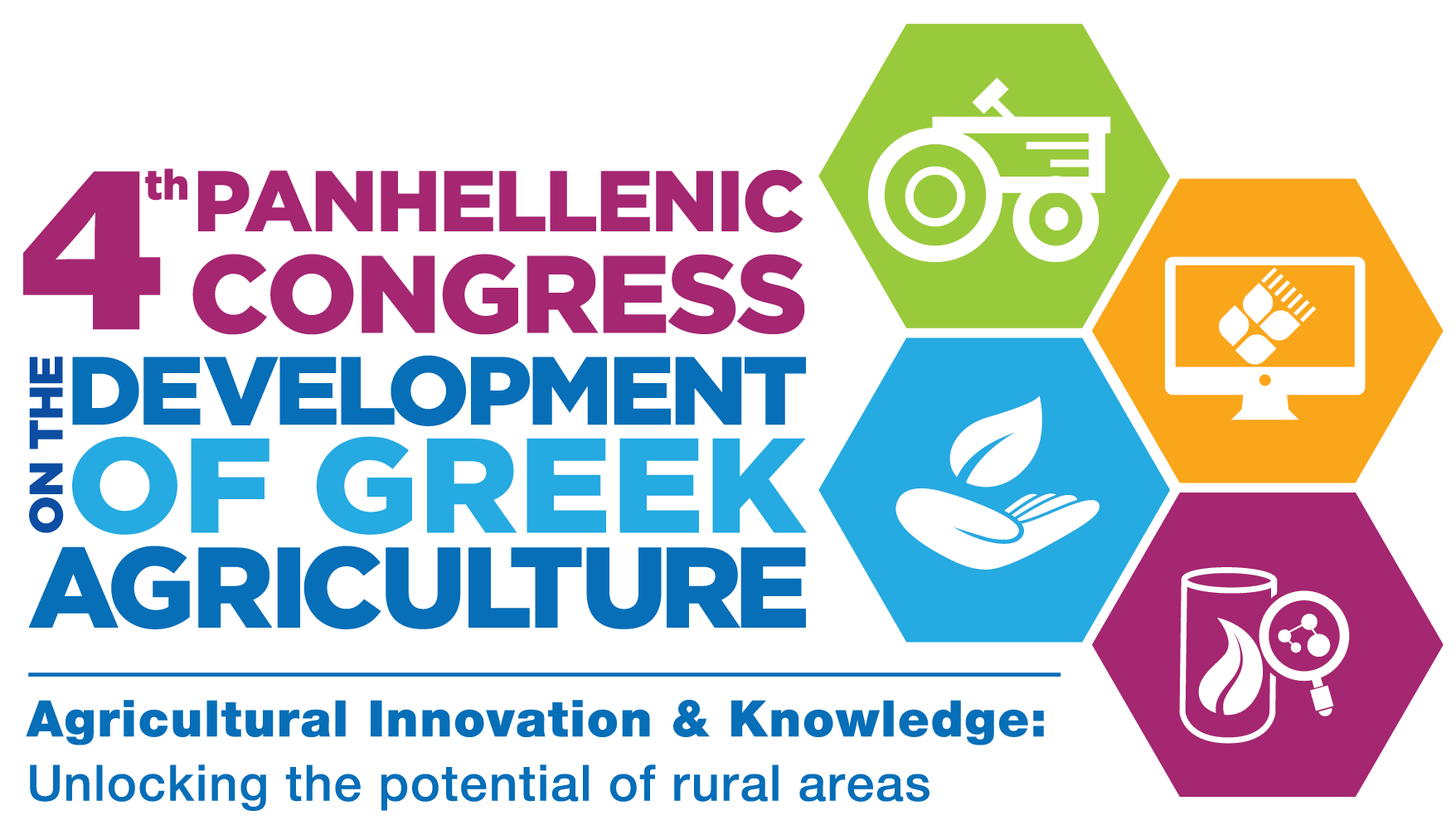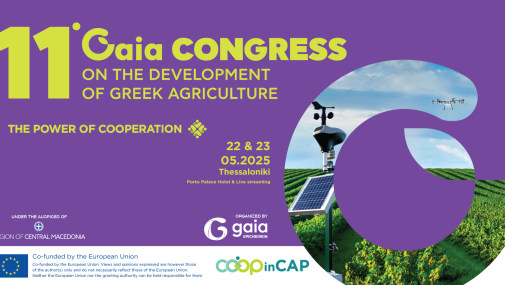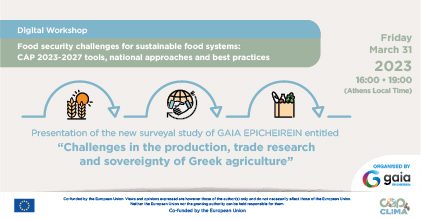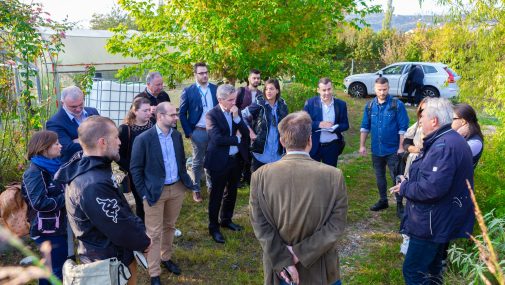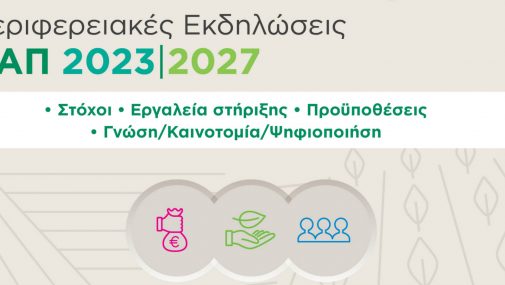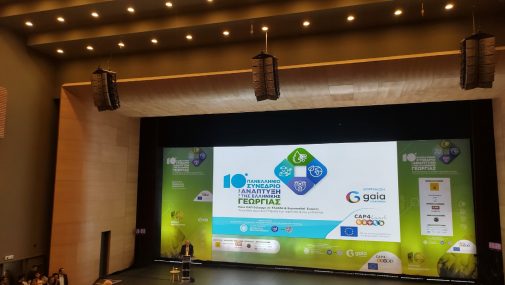This website uses cookies so that we can provide you with the best user experience possible. Cookie information is stored in your browser and performs functions such as recognising you when you return to our website and helping our team to understand which sections of the website you find most interesting and useful.
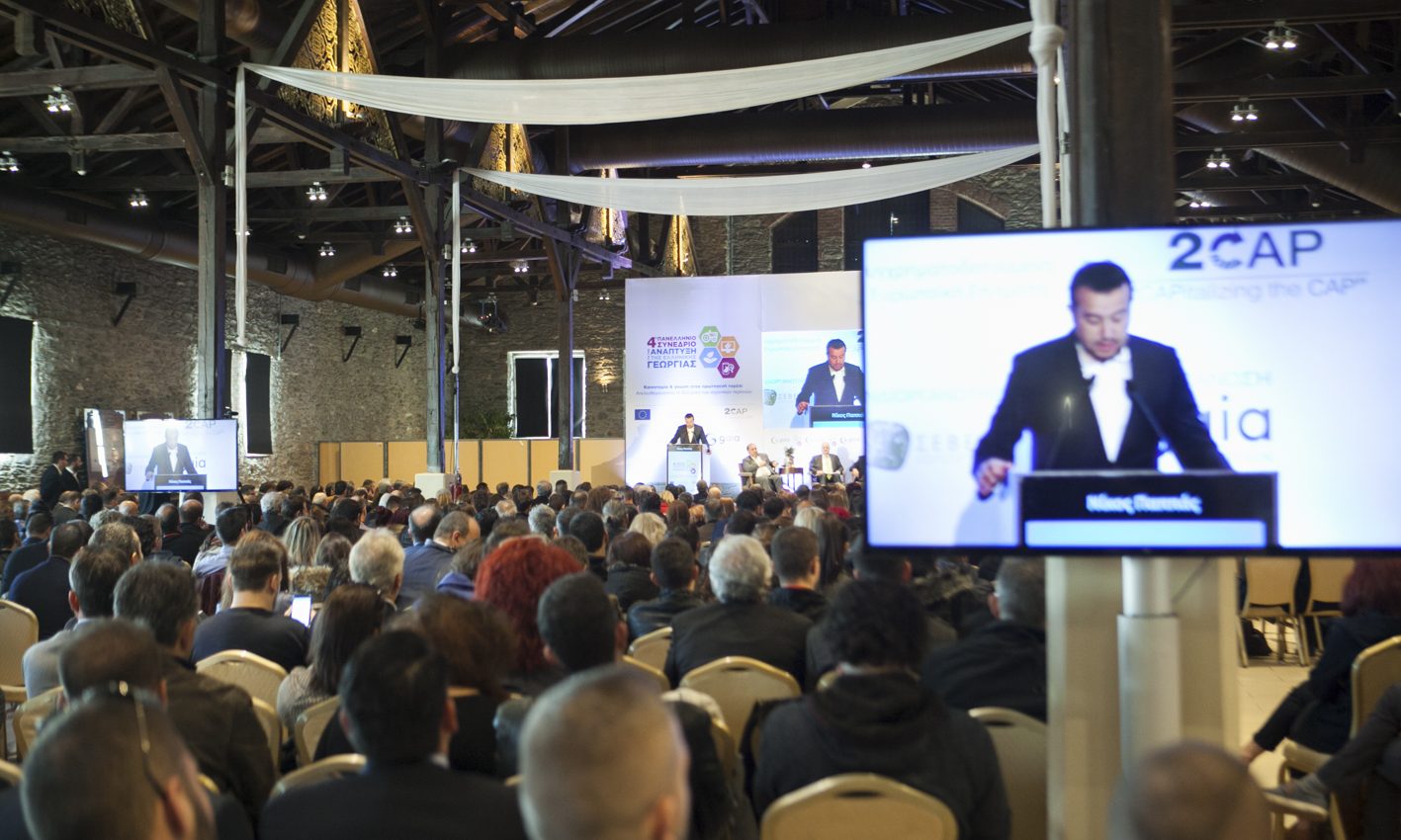
The heart of the Greek agri-food sector beat in Thessaloniki on 9-10 November, as sector representatives shared their vision for Greek and European agriculture, and exchanged views on the trends and policies that impact its growth, in the framework of the annual Panhellenic Congress on the Development of Greek Agriculture, which was co-organised with great success by GAIA EPICHEIREIN and SEVE (Greek Exporters Association), under the auspices of ENPE (Association of Greek Regions).
The 4thCongress was held at Porto Palace hotel and its subject was ‘Agricultural Innovation & Knowledge: unlocking the potential of rural areas’. Producers, cooperative managers from Greece and abroad, representatives of the academic and research community and of regional, national, and European authorities, as well as important entrepreneurial bodies of the food supply chain from Greece and abroad, spoke about the important challenges the agri-food sector is facing, and how the utilisation of innovation and, more specifically, smart farming, can provide the necessary added value to products.
Attendance was impressive throughout the 2-day Congress, while useful conclusions were drawn from the speeches heard during the 3 thematic sessions and 4 workshops that were held at the congress venue.
The congress commenced on Wednesday 8/11/2017 with a special event-presentation of the Olive Cultivation Encyclopaedia: ‘Olive Oil’.
The 1stday of the Congress
The works of the first day of the Congress commenced in the presence of attendees and guests from the political, business, local government, agricultural, and cooperative sectors, from Greece and abroad. The opening speech at the Congress was given by the Minister for Digital Policy, Telecommunications and Information, Nikos Pappas, while the Deputy Minister for Economy and Development, Mr Stergios Pitsiorlas, also spoke in the framework of the Congress’ works. In a recorded message addressed to the Congress European Commission spokesperson Margaritis Schinas underlined that ‘GAIA EPICHEIREIN operates as a model that highlights the importance of synergies and alliances, beyond ideological obsessions, taboo subjects and prejudices of the past, for the achievement of common developmental goals in the harsh environment of post-bailout Greece, which is not so distant’.
Attendees included Mr Thanasis Karteros, head of the Prime Minister’s Press Office, Mr Lefteris Kretsos, Secretary General of Information, Mr Stelios Rallis, Secretary General for Digital Policy, Mr Giorgos Christoforidis, Special Advisor to the Minister, Ms Vasiliki Apostolopoulou, Scientific Partner of the General Secretariat of Information and Communication Technology, the President of OPEKEPE Athanasios Kaprelis, and Vice Presidents Georgios Apostolakis and Georgios Kentros.
The 2ndday of the Congress
On the second day of the congress, issues related to the digital transformation of Greek agriculture and animal breeding were presented, with an emphasis on the role of technology and smart farming in the growth of the primary sector and the role of young people in agricultural production.
The second day of the Congress started with the President of GAIA EPICHEIREIN, Christodoulos Antoniadis, addressing the audience. Welcoming the attendees, Mr Antoniadis highlighted the important role of GAIA EPICHEIREIN in organising agricultural production and the economy, and stressed that agricultural development is based on its digitisation in order to become more competitive. He spoke of how GAIA EPICHEIREIN began, saying that it was the first to envision digital agriculture, when the vast majority of involved parties remained entrenched in non-developmental practices, and pointed out that digital agriculture can turn from wishful thinking into reality.
Taking the floor, the CEO of GAIA EPICHEIREIN Ioannis Koufoudakis mentioned the importance of the digital revolution in the agricultural sector, which, he stressed, is a way for young people to love the land and the countryside, a way to produce more while safeguarding the sustainability of Greek resources, and a way to make consumers feel safe about Greek products.
The address of the Minister for Digital Policy
In his address, the Minister for Digital Policy, Nikos Pappas, announced the ‘Agro Internet of Things’ project, an “internet” for agricultural production with a budget of 7.5 million Euros. As he said, upon its completion, it will be one of the most innovative projects in Europe facilitating farmers. It will operate by using land-based stations, sensors combined with satellite imaging and the evaluation of all time-series data from current systems. All data will be sorted and support the needs of all producers after relevant processing. Furthermore, the ‘Agro Internet of Things’ will be a farmer support platform and a tool assisting in the further automation of OPEKEPE certification procedures.
Next followed addresses by the Mayor of Thessaloniki, Yiannis Boutaris, who referred to the quality of Greek produce as a comparative advantage for its promotion in relevant markets, and Deputy Minister for Home Affairs (Macedonia-Thrace), Maria Kollia-Tsaroucha, who spoke about the positive steps taken by the government in the agricultural sector, which aim at a more organised future for the primary sector of the economy. The President of the Greek Exporters Association (SEVE), Kyriakos Loufakis, noted the necessity to increase the added value of agricultural products through the use of new technology, clarifying that precision farming is an advantage in this direction. The President of the Greek Association of Agricultural Cooperatives and Enterprises (SASOEE), Alexandros Kontos, discussed taxation and insurance in the agricultural sector, which are obstacles to the growth of Greek farming and animal breeding, and also supported the openness of Greece’s Agricultural Economy.
For Piraeus Bank, supporting the production process both in the short-term and long-term, providing advisory and training support, as well as high-quality services to agricultural bodies, is a strategic choice, underlined the Bank’s President, Giorgos Chatzinikolaou.
“What kind of agricultural production do we want?” asked former Minister of Agricultural Development & Food, Markos Bolaris, who underlined that the quality of Greek agricultural products can secure their presence in the largest foreign markets.
New Democracy spokesperson and MP for Serres region, Foteini Arampatzi, spoke of the need for a strong and modern agricultural entrepreneurship while, on behalf of Movement for Change, Michalis Tzelepis, also a Serres MP, asked that the legal issues concerning a contemporary developmental model for agricultural cooperatives be resolved.
Konstantinos Agorastos, Governor of Thessaly and President of the Association of Greek Regions (EN.PE), mentioned that “the Regions know how to collaborate in practice, and collaboration is a key requirement in the agricultural sector. People should be allowed to live and create, in order to reverse the desertification of the Greek countryside”.
Theofanis Papas, Deputy Governor of Rural Economy of the Region of Central Macedonia, discussed the focus of the Region on exports and asked “that we avoid examples of the past and mistakes that set back the primary sector. We hope that the future holds something better”.
Kostas Bakoyannis, Governor of Central Greece, supported that “GAIA EPICHEIREIN’s congress differs from all other congresses in value and in essence and that 50% of the agricultural income comes from decisions, not based on the market, but on European financial subsidies and aid. Innovation, openness, and utilisation of resources for the primary sector is the goal”.
Stavros Arnaoutakis, Governor of Crete, stated that “agriculture and animal breeding contributed to Greece’s GDP before the arrival of tourism in Crete. The region is systematically implementing an action plan to support those involved in the agri-food sector. The Agri-Food Cluster has contributed to the certification of 600 products on the island, with Cretan product exports reaching an annual value of 520 million Euros. Research and innovation must focus both on cultivation and processing”.
Theodoros Karypidis, Governor of Western Macedonia, characterised his region as the ‘Region of contrasts’, and asked for the implementation of policies that can set right years of injustice.
Thomas Magnusson, President of COGECA, supported in his speech that “science and technology in the primary sector provide a bright future for Greek producers, as they create new markets and provide safe products that consumers are increasingly searching for. These innovative practices applied in Greek agriculture must be promoted by all those implementing them”.
Vassilis Gounaris, CEO of BASF HELLAS SA, confirmed the view that BASF supports farmers and invests in new pioneering systems for agricultural holdings. He stressed, however, that Greece is wanting in the adoption of new technologies and that is due to the ageing farmer population and the fragmentation of agricultural holdings. He also encouraged Greek universities to connect with Greek farmers and agricultural cooperatives.
Yves Madre, co-founder of the Farm Europe think tank, supported that “we need more production, effectively managed and at a lower cost”. Gennaro Sicolo, President of Consorzio Nationale degli OLIVICOLTORΙ, supported that agriculture without innovation has no future.
Giorgos Kormentzas, Director General of GAIA EPICHEIREIN stated that “large scale change and interventions are required that must be implemented in a socially just way, which is what we are striving for as a company (GAIA EPICHEIREIN). We need researchers, universities, the state, and cooperatives on our side”.
Kostas Gougoulias, director of ‘THES gala’, stressed that financial and meaningful sacrifices are required by Greek producers, as well as trust in people with a vision and strategy who will take charge of Cooperatives; people capable of organising and managing such enterprises.
“The private insurance market views cooperatives as a modern-day enterprise”, stated Effie Kokoreli, Director of AgrInsurance & Bancassurance at Interamerican S.A.
The head of Agricultural Production at ‘Maxouli’ Olive Oil Producing Enterprises, Leonidas Polymenakos, stressed that the entire oil producing process at his enterprise, which is continuously receiving distinctions, is carried out using precision farming systems.
Dr Athanasios Tsaftaris, former Minister of Agricultural Development and Food, Academic Director at Perrotis College – American Farm School, mentioned all the steps in the agricultural process that are changing thanks to genomics and post-genomics that study the genomes of many different organisms at the same time.
Georgios Katsouranis, CEO, EXCELIXI S.A. Centre of Sustainable Entrepreneurship, asked that we all help the primary sector take the necessary steps towards modernisation.
Dr Thomas Bartzanas, Director of Research at the Institute for Bio-Economy and Agri-Technology, stated that he is willing to collaborate with anyone from the primary production sector who is interested in the utilisation of innovation.
“A shift towards innovation is necessary”, stated Spyridon Fountas, Assistant Professor at the Agricultural University of Athens.
Lastly, useful conclusions were made by Tasos Haniotis, Director of Agricultural Policy Analysis and Perspectives at the Directorate General for Agriculture, European Commission.
Workshops
Earlier, 4 parallel workshops were held, the first on Smart Farming, where four different case studies on smart farming and commercial service provision in Europe were presented. The second concerned the subject of Agri-food Trade in the Balkan region. The workshop presenters discussed many issues, problems, opportunities and proposals that are worth studying in the future. During the Workshops, and as part of a different unit, there was a presentation of the agrogate.gr export platform. The purpose of the platform is to promote the exports of Greek agricultural products and processed food globally. The subject of the 3rdWorkshop was Smart specialisation in the Agri-food sector: Regional approaches to agricultural innovation and knowledge. The workshop addressed issues like developing the role of regional growth in innovation and knowledge transfer in the agricultural sector. To that end, the competent Deputy Governors of 4 large regions of Greece, Central Greece, Central Macedonia, Thessaly and Peloponnese, presented the way in which they individually approach smart specialisation and innovation. Finally, the subject on the agenda of the 4th and final Workshop was the digitisation of the food supply chain. The potential of identifying the geographical origin of food through modern analysis techniques and implementing new technologies in the stockbreeding sector were analysed, as well as developments in the collection, analysis and processing of agri-food chain data.
